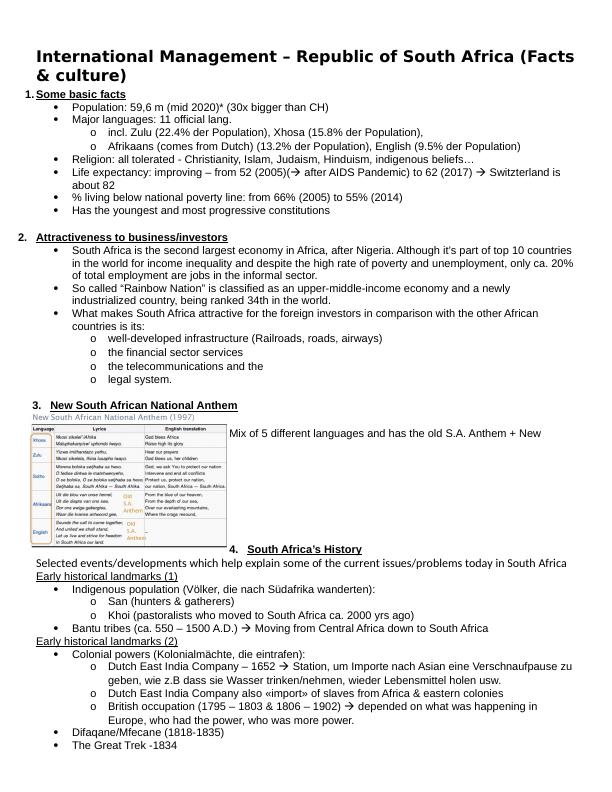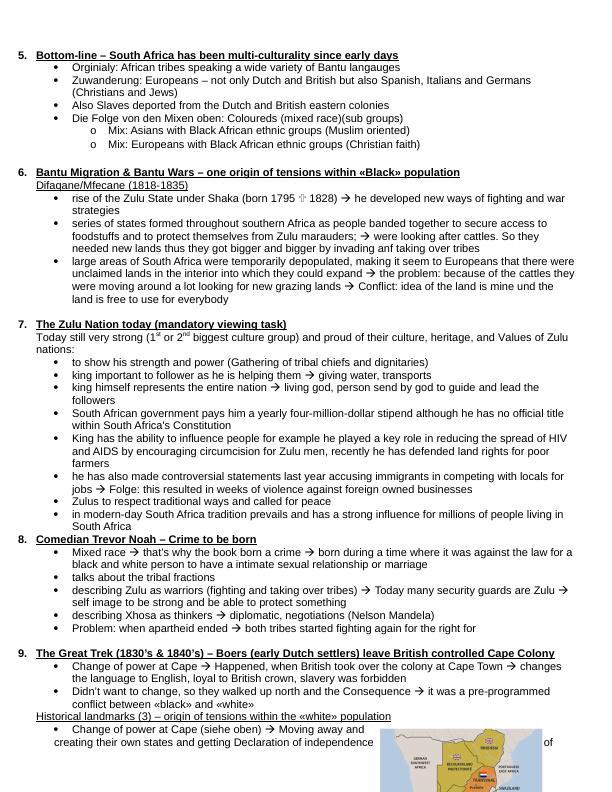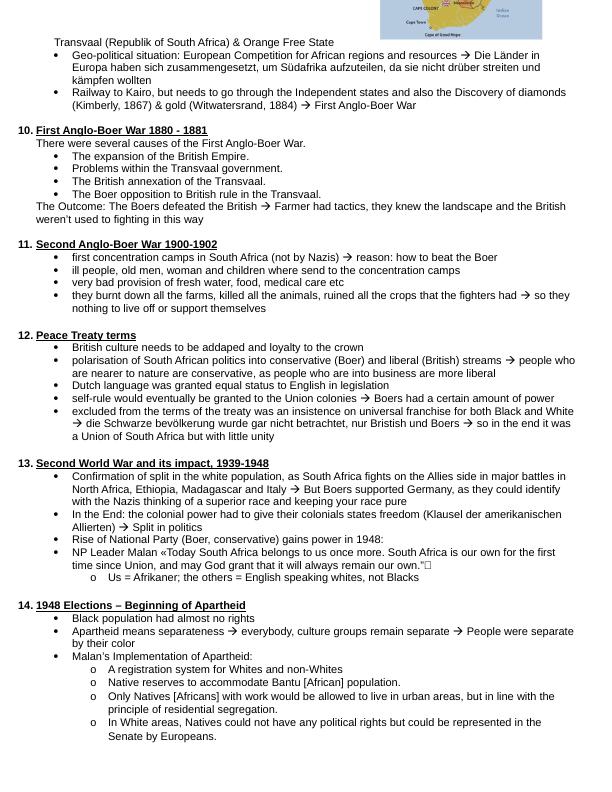International Management Assignment Sample
Added on 2021-09-30
9 Pages4122 Words58 Views
International Management – Republic of South Africa (Facts
& culture)
1.Some basic facts
Population: 59,6 m (mid 2020)* (30x bigger than CH)
Major languages: 11 official lang.
oincl. Zulu (22.4% der Population), Xhosa (15.8% der Population),
oAfrikaans (comes from Dutch) (13.2% der Population), English (9.5% der Population)
Religion: all tolerated - Christianity, Islam, Judaism, Hinduism, indigenous beliefs...
Life expectancy: improving – from 52 (2005)( after AIDS Pandemic) to 62 (2017) Switzterland is
about 82
% living below national poverty line: from 66% (2005) to 55% (2014)
Has the youngest and most progressive constitutions
2. Attractiveness to business/investors
South Africa is the second largest economy in Africa, after Nigeria. Although it’s part of top 10 countries
in the world for income inequality and despite the high rate of poverty and unemployment, only ca. 20%
of total employment are jobs in the informal sector.
So called “Rainbow Nation” is classified as an upper-middle-income economy and a newly
industrialized country, being ranked 34th in the world.
What makes South Africa attractive for the foreign investors in comparison with the other African
countries is its:
owell-developed infrastructure (Railroads, roads, airways)
othe financial sector services
othe telecommunications and the
olegal system.
3. New South African National Anthem
Mix of 5 different languages and has the old S.A. Anthem + New
4. South Africa’s History
Selected events/developments which help explain some of the current issues/problems today in South Africa
Early historical landmarks (1)
Indigenous population (Völker, die nach Südafrika wanderten):
oSan (hunters & gatherers)
oKhoi (pastoralists who moved to South Africa ca. 2000 yrs ago)
Bantu tribes (ca. 550 – 1500 A.D.) Moving from Central Africa down to South Africa
Early historical landmarks (2)
Colonial powers (Kolonialmächte, die eintrafen):
oDutch East India Company – 1652 Station, um Importe nach Asian eine Verschnaufpause zu
geben, wie z.B dass sie Wasser trinken/nehmen, wieder Lebensmittel holen usw.
oDutch East India Company also «import» of slaves from Africa & eastern colonies
oBritish occupation (1795 – 1803 & 1806 – 1902) depended on what was happening in
Europe, who had the power, who was more power.
Difaqane/Mfecane (1818-1835)
The Great Trek -1834
& culture)
1.Some basic facts
Population: 59,6 m (mid 2020)* (30x bigger than CH)
Major languages: 11 official lang.
oincl. Zulu (22.4% der Population), Xhosa (15.8% der Population),
oAfrikaans (comes from Dutch) (13.2% der Population), English (9.5% der Population)
Religion: all tolerated - Christianity, Islam, Judaism, Hinduism, indigenous beliefs...
Life expectancy: improving – from 52 (2005)( after AIDS Pandemic) to 62 (2017) Switzterland is
about 82
% living below national poverty line: from 66% (2005) to 55% (2014)
Has the youngest and most progressive constitutions
2. Attractiveness to business/investors
South Africa is the second largest economy in Africa, after Nigeria. Although it’s part of top 10 countries
in the world for income inequality and despite the high rate of poverty and unemployment, only ca. 20%
of total employment are jobs in the informal sector.
So called “Rainbow Nation” is classified as an upper-middle-income economy and a newly
industrialized country, being ranked 34th in the world.
What makes South Africa attractive for the foreign investors in comparison with the other African
countries is its:
owell-developed infrastructure (Railroads, roads, airways)
othe financial sector services
othe telecommunications and the
olegal system.
3. New South African National Anthem
Mix of 5 different languages and has the old S.A. Anthem + New
4. South Africa’s History
Selected events/developments which help explain some of the current issues/problems today in South Africa
Early historical landmarks (1)
Indigenous population (Völker, die nach Südafrika wanderten):
oSan (hunters & gatherers)
oKhoi (pastoralists who moved to South Africa ca. 2000 yrs ago)
Bantu tribes (ca. 550 – 1500 A.D.) Moving from Central Africa down to South Africa
Early historical landmarks (2)
Colonial powers (Kolonialmächte, die eintrafen):
oDutch East India Company – 1652 Station, um Importe nach Asian eine Verschnaufpause zu
geben, wie z.B dass sie Wasser trinken/nehmen, wieder Lebensmittel holen usw.
oDutch East India Company also «import» of slaves from Africa & eastern colonies
oBritish occupation (1795 – 1803 & 1806 – 1902) depended on what was happening in
Europe, who had the power, who was more power.
Difaqane/Mfecane (1818-1835)
The Great Trek -1834

5. Bottom-line – South Africa has been multi-culturality since early days
Orginialy: African tribes speaking a wide variety of Bantu langauges
Zuwanderung: Europeans – not only Dutch and British but also Spanish, Italians and Germans
(Christians and Jews)
Also Slaves deported from the Dutch and British eastern colonies
Die Folge von den Mixen oben: Coloureds (mixed race)(sub groups)
oMix: Asians with Black African ethnic groups (Muslim oriented)
oMix: Europeans with Black African ethnic groups (Christian faith)
6. Bantu Migration & Bantu Wars – one origin of tensions within «Black» population
Difaqane/Mfecane (1818-1835)
rise of the Zulu State under Shaka (born 1795 U 1828) he developed new ways of fighting and war
strategies
series of states formed throughout southern Africa as people banded together to secure access to
foodstuffs and to protect themselves from Zulu marauders; were looking after cattles. So they
needed new lands thus they got bigger and bigger by invading anf taking over tribes
large areas of South Africa were temporarily depopulated, making it seem to Europeans that there were
unclaimed lands in the interior into which they could expand the problem: because of the cattles they
were moving around a lot looking for new grazing lands Conflict: idea of the land is mine und the
land is free to use for everybody
7. The Zulu Nation today (mandatory viewing task)
Today still very strong (1st or 2nd biggest culture group) and proud of their culture, heritage, and Values of Zulu
nations:
to show his strength and power (Gathering of tribal chiefs and dignitaries)
king important to follower as he is helping them giving water, transports
king himself represents the entire nation living god, person send by god to guide and lead the
followers
South African government pays him a yearly four-million-dollar stipend although he has no official title
within South Africa's Constitution
King has the ability to influence people for example he played a key role in reducing the spread of HIV
and AIDS by encouraging circumcision for Zulu men, recently he has defended land rights for poor
farmers
he has also made controversial statements last year accusing immigrants in competing with locals for
jobs Folge: this resulted in weeks of violence against foreign owned businesses
Zulus to respect traditional ways and called for peace
in modern-day South Africa tradition prevails and has a strong influence for millions of people living in
South Africa
8. Comedian Trevor Noah – Crime to be born
Mixed race that’s why the book born a crime born during a time where it was against the law for a
black and white person to have a intimate sexual relationship or marriage
talks about the tribal fractions
describing Zulu as warriors (fighting and taking over tribes) Today many security guards are Zulu
self image to be strong and be able to protect something
describing Xhosa as thinkers diplomatic, negotiations (Nelson Mandela)
Problem: when apartheid ended both tribes started fighting again for the right for
9. The Great Trek (1830’s & 1840’s) – Boers (early Dutch settlers) leave British controlled Cape Colony
Change of power at Cape Happened, when British took over the colony at Cape Town changes
the language to English, loyal to British crown, slavery was forbidden
Didn’t want to change, so they walked up north and the Consequence it was a pre-programmed
conflict between «black» and «white»
Historical landmarks (3) – origin of tensions within the «white» population
Change of power at Cape (siehe oben) Moving away and
creating their own states and getting Declaration of independence of
Orginialy: African tribes speaking a wide variety of Bantu langauges
Zuwanderung: Europeans – not only Dutch and British but also Spanish, Italians and Germans
(Christians and Jews)
Also Slaves deported from the Dutch and British eastern colonies
Die Folge von den Mixen oben: Coloureds (mixed race)(sub groups)
oMix: Asians with Black African ethnic groups (Muslim oriented)
oMix: Europeans with Black African ethnic groups (Christian faith)
6. Bantu Migration & Bantu Wars – one origin of tensions within «Black» population
Difaqane/Mfecane (1818-1835)
rise of the Zulu State under Shaka (born 1795 U 1828) he developed new ways of fighting and war
strategies
series of states formed throughout southern Africa as people banded together to secure access to
foodstuffs and to protect themselves from Zulu marauders; were looking after cattles. So they
needed new lands thus they got bigger and bigger by invading anf taking over tribes
large areas of South Africa were temporarily depopulated, making it seem to Europeans that there were
unclaimed lands in the interior into which they could expand the problem: because of the cattles they
were moving around a lot looking for new grazing lands Conflict: idea of the land is mine und the
land is free to use for everybody
7. The Zulu Nation today (mandatory viewing task)
Today still very strong (1st or 2nd biggest culture group) and proud of their culture, heritage, and Values of Zulu
nations:
to show his strength and power (Gathering of tribal chiefs and dignitaries)
king important to follower as he is helping them giving water, transports
king himself represents the entire nation living god, person send by god to guide and lead the
followers
South African government pays him a yearly four-million-dollar stipend although he has no official title
within South Africa's Constitution
King has the ability to influence people for example he played a key role in reducing the spread of HIV
and AIDS by encouraging circumcision for Zulu men, recently he has defended land rights for poor
farmers
he has also made controversial statements last year accusing immigrants in competing with locals for
jobs Folge: this resulted in weeks of violence against foreign owned businesses
Zulus to respect traditional ways and called for peace
in modern-day South Africa tradition prevails and has a strong influence for millions of people living in
South Africa
8. Comedian Trevor Noah – Crime to be born
Mixed race that’s why the book born a crime born during a time where it was against the law for a
black and white person to have a intimate sexual relationship or marriage
talks about the tribal fractions
describing Zulu as warriors (fighting and taking over tribes) Today many security guards are Zulu
self image to be strong and be able to protect something
describing Xhosa as thinkers diplomatic, negotiations (Nelson Mandela)
Problem: when apartheid ended both tribes started fighting again for the right for
9. The Great Trek (1830’s & 1840’s) – Boers (early Dutch settlers) leave British controlled Cape Colony
Change of power at Cape Happened, when British took over the colony at Cape Town changes
the language to English, loyal to British crown, slavery was forbidden
Didn’t want to change, so they walked up north and the Consequence it was a pre-programmed
conflict between «black» and «white»
Historical landmarks (3) – origin of tensions within the «white» population
Change of power at Cape (siehe oben) Moving away and
creating their own states and getting Declaration of independence of

Transvaal (Republik of South Africa) & Orange Free State
Geo-political situation: European Competition for African regions and resources Die Länder in
Europa haben sich zusammengesetzt, um Südafrika aufzuteilen, da sie nicht drüber streiten und
kämpfen wollten
Railway to Kairo, but needs to go through the Independent states and also the Discovery of diamonds
(Kimberly, 1867) & gold (Witwatersrand, 1884) First Anglo-Boer War
10. First Anglo-Boer War 1880 - 1881
There were several causes of the First Anglo-Boer War.
The expansion of the British Empire.
Problems within the Transvaal government.
The British annexation of the Transvaal.
The Boer opposition to British rule in the Transvaal.
The Outcome: The Boers defeated the British Farmer had tactics, they knew the landscape and the British
weren’t used to fighting in this way
11. Second Anglo-Boer War 1900-1902
first concentration camps in South Africa (not by Nazis) reason: how to beat the Boer
ill people, old men, woman and children where send to the concentration camps
very bad provision of fresh water, food, medical care etc
they burnt down all the farms, killed all the animals, ruined all the crops that the fighters had so they
nothing to live off or support themselves
12. Peace Treaty terms
British culture needs to be addaped and loyalty to the crown
polarisation of South African politics into conservative (Boer) and liberal (British) streams people who
are nearer to nature are conservative, as people who are into business are more liberal
Dutch language was granted equal status to English in legislation
self-rule would eventually be granted to the Union colonies Boers had a certain amount of power
excluded from the terms of the treaty was an insistence on universal franchise for both Black and White
die Schwarze bevölkerung wurde gar nicht betrachtet, nur Bristish und Boers so in the end it was
a Union of South Africa but with little unity
13. Second World War and its impact, 1939-1948
Confirmation of split in the white population, as South Africa fights on the Allies side in major battles in
North Africa, Ethiopia, Madagascar and Italy But Boers supported Germany, as they could identify
with the Nazis thinking of a superior race and keeping your race pure
In the End: the colonial power had to give their colonials states freedom (Klausel der amerikanischen
Allierten) Split in politics
Rise of National Party (Boer, conservative) gains power in 1948:
NP Leader Malan «Today South Africa belongs to us once more. South Africa is our own for the first
time since Union, and may God grant that it will always remain our own.”
oUs = Afrikaner; the others = English speaking whites, not Blacks
14. 1948 Elections – Beginning of Apartheid
Black population had almost no rights
Apartheid means separateness everybody, culture groups remain separate People were separate
by their color
Malan’s Implementation of Apartheid:
oA registration system for Whites and non-Whites
oNative reserves to accommodate Bantu [African] population.
oOnly Natives [Africans] with work would be allowed to live in urban areas, but in line with the
principle of residential segregation.
oIn White areas, Natives could not have any political rights but could be represented in the
Senate by Europeans.
Geo-political situation: European Competition for African regions and resources Die Länder in
Europa haben sich zusammengesetzt, um Südafrika aufzuteilen, da sie nicht drüber streiten und
kämpfen wollten
Railway to Kairo, but needs to go through the Independent states and also the Discovery of diamonds
(Kimberly, 1867) & gold (Witwatersrand, 1884) First Anglo-Boer War
10. First Anglo-Boer War 1880 - 1881
There were several causes of the First Anglo-Boer War.
The expansion of the British Empire.
Problems within the Transvaal government.
The British annexation of the Transvaal.
The Boer opposition to British rule in the Transvaal.
The Outcome: The Boers defeated the British Farmer had tactics, they knew the landscape and the British
weren’t used to fighting in this way
11. Second Anglo-Boer War 1900-1902
first concentration camps in South Africa (not by Nazis) reason: how to beat the Boer
ill people, old men, woman and children where send to the concentration camps
very bad provision of fresh water, food, medical care etc
they burnt down all the farms, killed all the animals, ruined all the crops that the fighters had so they
nothing to live off or support themselves
12. Peace Treaty terms
British culture needs to be addaped and loyalty to the crown
polarisation of South African politics into conservative (Boer) and liberal (British) streams people who
are nearer to nature are conservative, as people who are into business are more liberal
Dutch language was granted equal status to English in legislation
self-rule would eventually be granted to the Union colonies Boers had a certain amount of power
excluded from the terms of the treaty was an insistence on universal franchise for both Black and White
die Schwarze bevölkerung wurde gar nicht betrachtet, nur Bristish und Boers so in the end it was
a Union of South Africa but with little unity
13. Second World War and its impact, 1939-1948
Confirmation of split in the white population, as South Africa fights on the Allies side in major battles in
North Africa, Ethiopia, Madagascar and Italy But Boers supported Germany, as they could identify
with the Nazis thinking of a superior race and keeping your race pure
In the End: the colonial power had to give their colonials states freedom (Klausel der amerikanischen
Allierten) Split in politics
Rise of National Party (Boer, conservative) gains power in 1948:
NP Leader Malan «Today South Africa belongs to us once more. South Africa is our own for the first
time since Union, and may God grant that it will always remain our own.”
oUs = Afrikaner; the others = English speaking whites, not Blacks
14. 1948 Elections – Beginning of Apartheid
Black population had almost no rights
Apartheid means separateness everybody, culture groups remain separate People were separate
by their color
Malan’s Implementation of Apartheid:
oA registration system for Whites and non-Whites
oNative reserves to accommodate Bantu [African] population.
oOnly Natives [Africans] with work would be allowed to live in urban areas, but in line with the
principle of residential segregation.
oIn White areas, Natives could not have any political rights but could be represented in the
Senate by Europeans.

End of preview
Want to access all the pages? Upload your documents or become a member.
